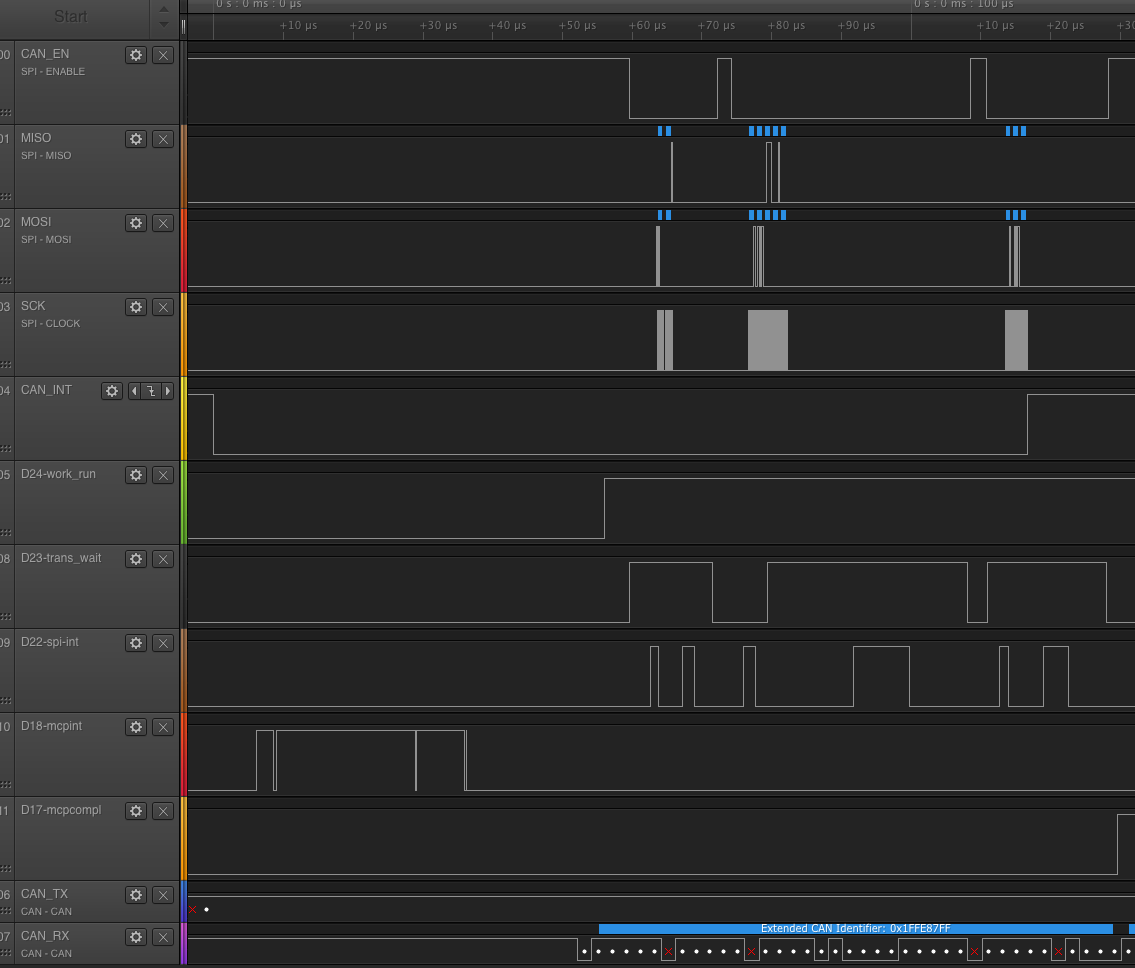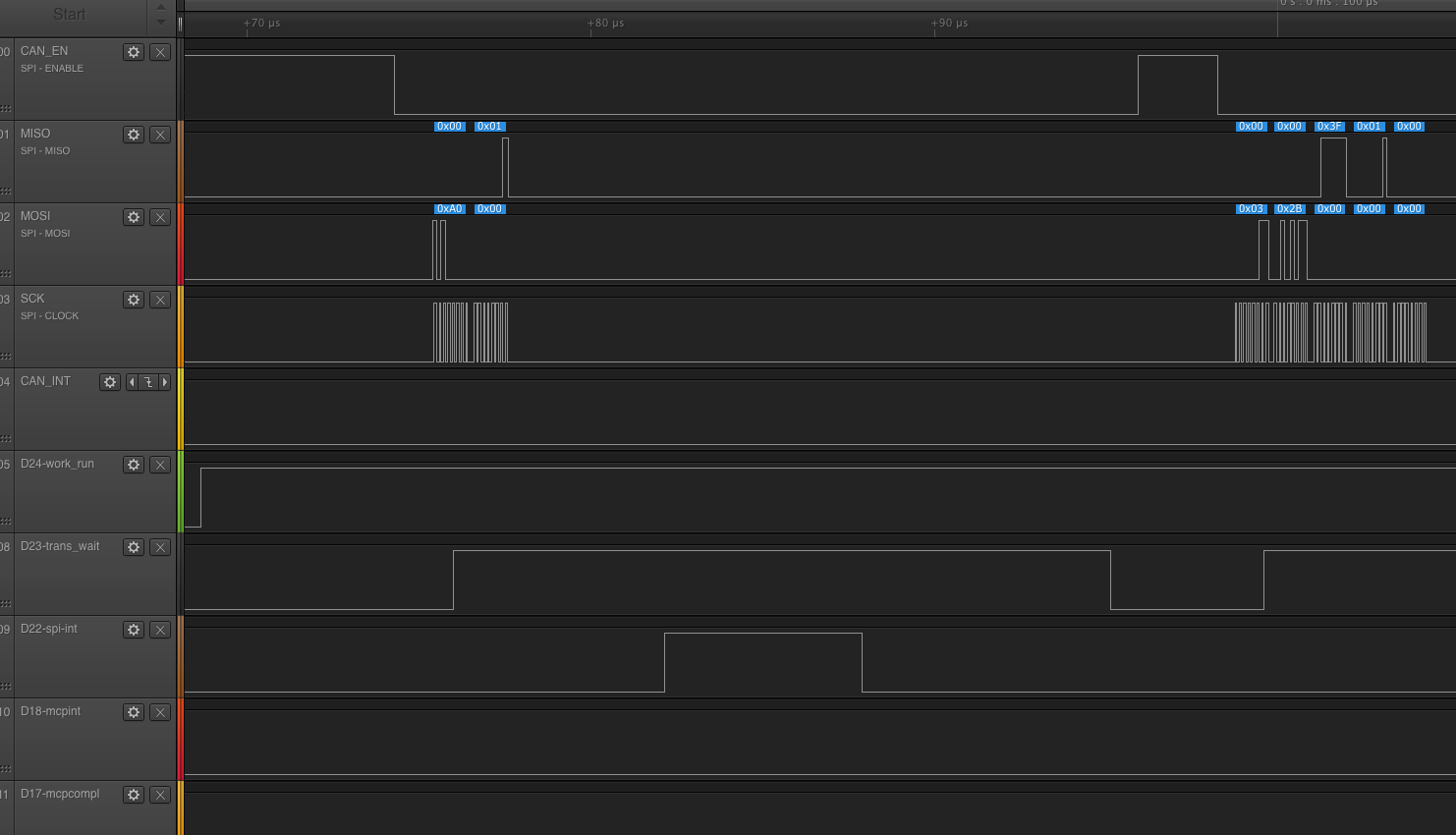forked from notro/spi-bcm2708
-
Notifications
You must be signed in to change notification settings - Fork 11
spi_bcm2708situation
msperl edited this page Feb 26, 2015
·
9 revisions
- Uses/implements:
- "depreciated" API which results in code duplication/unmanaged code
- separate worker thread/queue without changing RT-priority
- interrupt handler
- supports LoSSI/9Bit transfers
- implements as per "BCM2834 ARM Peripherals" this includes
- recommendations for filling FIFOs (16bytes then 12) as per 10.6.2/Page 158
- recommendations for CLK to be a power of 2 - as per 10.5 CLK-Register/Page 156
- limited to 2/3 SPI devices - no arbitrary GPIO as CS support
- Bugs:
- Inverted CS does not work correctly if there are 2 or more devices
these have the "gpio-timing-instrumentation" enabled and were run on a RPI2 similar/worse pattern happen on a RPI1
Note also that there are channels:
- 4 - CAN_INT - the CAN interrupt signaling a message has arrived
- 5 - D24 - work_run - inside the bcm2835_spi_transfer_one (potentially sleeping)
- 8 - D23 - trans_wait - waiting on completion inside of transmit code (in interrupt)
- 9 - D22 - spi_int - inside the SPI interrupt
- 10 - D18 - mcp-int - inside the interrupt handler of the mcp2515
- 11 - D17 - mcpcompl - inside one of the mcp2515 completion routines

Measurements:
- time between CAN-interrupt down and inside CAN interrupt handler: 6.16us
- time between first CAN message scheduled and the workqueue getting woken up: 27.04us
- time from Workqueue-start to CS-down: 3.64us
- time from CS-Down to Spi-interrupt: 3.04us
- time from CS-Down to first bit transferred: 3.96us
- time taken to transfer the 2 bytes: 2.12us
- time from last bit sent to spi_interrupt: 1.52us
- time from last bit sent to workqueue woken up: 5.72us
- time from workqueue woken to CS-up: 0.72us
- time from CS-down to CS-up: 12.56us
- time from Workqueue woken to mcp-completion code called: 1.68us (after 2 more transmits)
Issues observed:
- Transfers take 8 times as long as the transfer itself:
- 2.12us data and 12.56us CS down for 2 bytes - that is 16% utilization
- 5.56us data and 34.32us CS down for 5 bytes - that is 16% utilization
- variations are high for these variations - there is lots of "scheduling" jitter...
- 3us are typically between CS down and the first byte getting sent (but sometimes these are longer)
- this is mostly due to the fact that the interrupt handler takes so long to start and push data into the fifo
- also we see lots of WAIT for completions (in the case of multiple transfers for a single transfer like write X then read Y)
Summary:
- scheduling of tasks is a major breaking-point (wakeups)
- also the scheduling interrupt-latencies are quite high
- for a single "simple" transfer we have:
- 2 interrupts (fill in initially and draining in the end)
- 3 task switches:
- scheduling process (IRQ or other) to queued thread (transmit_one)
- sleeping and waiting for Completion inside transmit_one
- waking the transmit_one thread for further processing
- often the completion code will wake up another kernel thread (especially when using the synchronous spi interfaces)
- we can remove one interrupt from the equation by filling the FIFO before enabling interrupts

Measurements:
- time between CAN-interrupt down and inside CAN interrupt handler: 9.88us
- time between first CAN message scheduled and the workqueue getting woken up: 29.04us
- time from Workqueue-start to CS-down: 5.64us
- time from CS-Down to first bit transferred: 1.12us (but sometimes also only 0.52us)
- time taken to transfer the 2 bytes: 2.12us
- time from last bit sent to spi_interrupt: 4.56us
- time from last bit sent to workqueue woken up: 17.52us
- time from workqueue woken to CS-up: 0.8us
- time from CS-down to CS-up: 21.64us
- time from Workqueue woken to mcp-completion code called: 2.44us (after 2 more transmits)
Issues observed:
- the "starting" gap has been minimized and we have one interrupt less to handle
- but it still leaves us with:
- lots of latencies if we transfer more bytes
- Interrupt-handler waking up the completion and the workqueue resuming its work